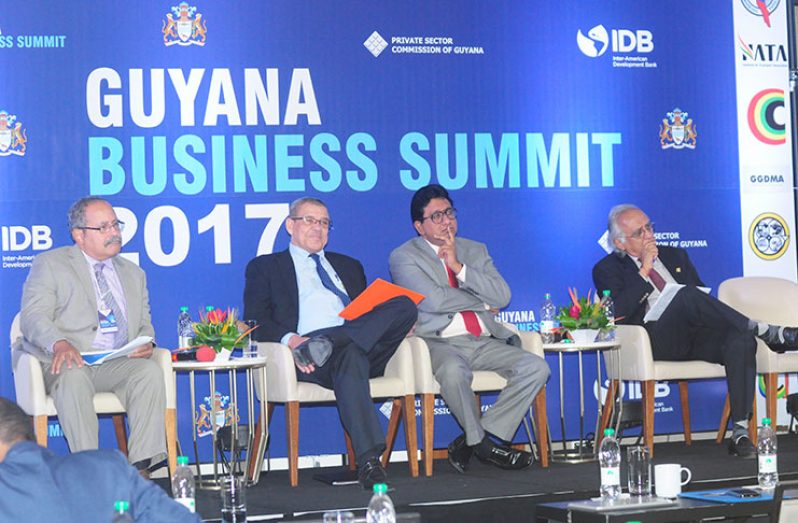THERE is “no quick fix” to taxation reform, said Guyana Revenue Authority (GRA) Commissioner General, Godfrey Statia, who contended that the reform process will take at least 10 years.
Former Attorney General Anil Nandlall, local economist from the Inter-American Development Bank, Mark Wenner; Attorney-at-Law Christopher Ram and Statia were engaged in an intense discussion on taxation at the Business Summit on Thursday at the Marriott Hotel.
In 2016, the National Tax Reform Committee (TRC) which both Ram and Statia were a part of had submitted a 133-page report to Finance Minister, Winston Jordan.
The report had a number of proposals that Ram and other panelists believed should have been implemented.
Though Statia made it clear that he is not in charge of making policy decision, he explained that it would take time for those measures to be implemented.
Prior to the remarks by the GRA Commissioner General, Nandlall said there is need for the revision of taxes, such as 14 per cent Value Added Tax (VAT) on utilities and the lowering of corporation tax from 40 per cent.
Statia agreed that VAT on electricity and water should be lowered but said there has been no discussion so far about the reduction of VAT.
“Instead of decreasing those taxes, there should be a decrease in personal tax and let the disposable income increase… there needs to be moderate rates that will improve efficiency,” said the Head of GRA who went on to say that higher tax rates will lead to more corruption and collusion for tax evasion.
Nandlall also expressed that increasing existing tax rates will add to a “depressed” economy.
In addition to what was said, when asked about the comparison between taxation and private investment, Wenner said higher tax rates mean there will be less private investments.
Minister within the Ministry of Finance, Jaipaul Sharma during his presentation earlier in the day said government needs to ensure that the tax system is equipped to maximise revenue collection.
The minister reminded the gathering about the review of the tax system that revealed it was inefficient and inequitable because it was characterised by high tax rates and heavy tax burdens, widespread tax evasion and an abuse of tax exemptions.
“We need to distribute tax returns equitably… all government face challenges when they attempt to make changes to the existing system,” he said, adding that they have been listening to the concerns raised by the Private Sector when crafting fiscal measures.
The government however intends on widening the consultation for 2018 and all the recommendations will be reviewed so that there can be changes where necessary.
Sharma however reminded investors that the government is aspiring for structural transformation to foster inclusive growth.
Private sector investors were assured of the necessary fiscal support they will get to expand their investments.




.png)









